一般将来时英语一般过去时现在进行时一般现在时专项练习PPT课件
合集下载
一般现在时现在进行时和一般过去时和一般将来时态ppt课件

• I was not born in 1980. • Were you born in 1980?
经营者提供商品或者服务有欺诈行为 的,应 当按照 消费者 的要求 增加赔 偿其受 到的损 失,增 加赔偿 的金额 为消费 者购买 商品的 价款或 接受服 务的费 用
第二种
含有行为动词的
• 肯定结构 • 主语+行为动词(过去式)+其它
加es.如:study carry
练习:写出下列动词的三单形式
enjoyS stays plays stops runs
have has are is
经营者提供商品或者服务有欺诈行为 的,应 当按照 消费者 的要求 增加赔 偿其受 到的损 失,增 加赔偿 的金额 为消费 者购买 商品的 价款或 接受服 务的费 用
• 3)末尾只有一个辅音字母的重读闭音节,应先双 写这个辅音字母,再加-ed.
• e.g. shop-----shopped; stopped
• 4)以"辅音字母+y"结尾的动词,先把y变成i,再加ed. e.g. carry----carried; study------studied.
经营者提供商品或者服务有欺诈行为 的,应 当按照 消费者 的要求 增加赔 偿其受 到的损 失,增 加赔偿 的金额 为消费 者购买 商品的 价款或 接受服 务的费 用
prefer preferring
经营者提供商品或者服务有欺诈行为 的,应 当按照 消费者 的要求 增加赔 偿其受 到的损 失,增 加赔偿 的金额 为消费 者购买 商品的 价款或 接受服 务的费 用
一般过去时
•
一般过去时主要表示过去某时发生的动作或 情况
• 1态)。过去某个时间所发生的动作或存在的状
经营者提供商品或者服务有欺诈行为 的,应 当按照 消费者 的要求 增加赔 偿其受 到的损 失,增 加赔偿 的金额 为消费 者购买 商品的 价款或 接受服 务的费 用
第二种
含有行为动词的
• 肯定结构 • 主语+行为动词(过去式)+其它
加es.如:study carry
练习:写出下列动词的三单形式
enjoyS stays plays stops runs
have has are is
经营者提供商品或者服务有欺诈行为 的,应 当按照 消费者 的要求 增加赔 偿其受 到的损 失,增 加赔偿 的金额 为消费 者购买 商品的 价款或 接受服 务的费 用
• 3)末尾只有一个辅音字母的重读闭音节,应先双 写这个辅音字母,再加-ed.
• e.g. shop-----shopped; stopped
• 4)以"辅音字母+y"结尾的动词,先把y变成i,再加ed. e.g. carry----carried; study------studied.
经营者提供商品或者服务有欺诈行为 的,应 当按照 消费者 的要求 增加赔 偿其受 到的损 失,增 加赔偿 的金额 为消费 者购买 商品的 价款或 接受服 务的费 用
prefer preferring
经营者提供商品或者服务有欺诈行为 的,应 当按照 消费者 的要求 增加赔 偿其受 到的损 失,增 加赔偿 的金额 为消费 者购买 商品的 价款或 接受服 务的费 用
一般过去时
•
一般过去时主要表示过去某时发生的动作或 情况
• 1态)。过去某个时间所发生的动作或存在的状
英语时态8种基本时态讲解.ppt课件

4)动词过去式变化规则。 a)一般情况下的词加-ed. work---worked call----called b)以不发音的字母e结尾的单词直接加-d . live----lived change----changed smoke----smoked die----died graduate----graduated drive----drove
8.过去完成时 表示动作发生在过去某一时间之前已经完成的动作或状态, 强调“过去的过去”, 常与 by the time, by the end of…,before , by 等引导时间的状语连用。
基本结构 主语+ had + 动词过去分词 + 其他成分 When I got to the cinema yesterday the film had begun already. He had learned English before he came here.
现在完成时与一般过去时的区别: 1)现在完成时侧重于对现在的影响;而一般过去时侧重于某一动作发生在过去某个时间或某段时间。即现在完成时侧重于现在的结果,而一般过去时侧重于动作发生的时间。例如:
I have seen the film. 我看过这部电影。(现在我仍记得电影的内容) I saw the film three days ago. 三天前我看了这部电影。(强调是三天前,而不是别的什么时候看的电影)
be going to含有“打算,准备”的意思,而will则没有这个意思, She is going to lend us her book. He will be here in half an hour.
be about to+V.原形(意为马上做某事,在时间上指最近的将来) I am about to leave school. 不能与表示时间的副词连用。 They are about to set out.(√) They are about to set,变y为i加-ed. study----studied carry----carried cry----cried try----tried d)以元音字母+y结尾的单词直接加-ed. play----played stay----stayed
8.过去完成时 表示动作发生在过去某一时间之前已经完成的动作或状态, 强调“过去的过去”, 常与 by the time, by the end of…,before , by 等引导时间的状语连用。
基本结构 主语+ had + 动词过去分词 + 其他成分 When I got to the cinema yesterday the film had begun already. He had learned English before he came here.
现在完成时与一般过去时的区别: 1)现在完成时侧重于对现在的影响;而一般过去时侧重于某一动作发生在过去某个时间或某段时间。即现在完成时侧重于现在的结果,而一般过去时侧重于动作发生的时间。例如:
I have seen the film. 我看过这部电影。(现在我仍记得电影的内容) I saw the film three days ago. 三天前我看了这部电影。(强调是三天前,而不是别的什么时候看的电影)
be going to含有“打算,准备”的意思,而will则没有这个意思, She is going to lend us her book. He will be here in half an hour.
be about to+V.原形(意为马上做某事,在时间上指最近的将来) I am about to leave school. 不能与表示时间的副词连用。 They are about to set out.(√) They are about to set,变y为i加-ed. study----studied carry----carried cry----cried try----tried d)以元音字母+y结尾的单词直接加-ed. play----played stay----stayed
时态(一般现在时一般过去时一般将来时)(课堂PPT)

——I’m an engineer. I _____ in a company in
Wuhan. I like my job very much.
A. work
B. had worked
C. wiቤተ መጻሕፍቲ ባይዱl work
D. worked
6.—Is your father a doctor?
—Yes, he is. He__________ in Town Hospital.
A. has worked B. had worked
C. works
D. worked
7.Every year many foreigners _________to China
to learn Chinese.
A. have come B. comes
C. came D. come
9
The Simple Past Tense
A. play B. plays C. playing D. played 2.My mother will take me to the movie if she _________ free this weekend.
A. is B. will be C. was D. would be 3.The girls will have a trip if it _________fine.
时间一过去, 结尾加ed; 尾巴有个e, 只要添个d;
重闭单辅音, 双写再ed; 辅音y结尾, 变为-ied。
Gongming lived in Han Dynasty.
10
• 一般过去时(simple past tense) 1.概念 一般过去时表示过去某一时
初中英语六种时态复习课件(35张PPT)

②while 引导的从句表示“在……期间”,主从句谓语动词所表示的动 作同时ቤተ መጻሕፍቲ ባይዱ生。这时,主从句都用过去进行时。
e.g.:My father was reading the newspaper while my mother was watching TV.当我的妈妈看电视的时候,我的爸爸正在看报纸。
(2)表示普遍真理或客观事实。 e.g.:The sun rises in the east.太阳从东方升起。 (3)在条件状语从句和时间状语从句中,用一般现在时表示将来。 e.g.:If it doesn't rain tomorrow,we will go for a picnic.如果明天不下 雨,我们将去野餐。 (4)在某些以 here,there 开头的句子中用一般现在时表示正在发生的动作。 e.g.:There goes the bell.铃响了。
(3)现在进行时表示将来 表示位置移动的动词 go,come,leave,fly,start,meet,move 等, 可以用现在进行时表示将要发生的事。 e.g.:We are leaving for London.我们就要动身去伦敦了。
(4)一般现在时表示将来 ①表示按规定或时间表预计要发生的动作。 e.g.:Our plane takes off at 8:10.我们的飞机 8:10 起飞。 ②当主句为一般将来时,或含有情态动词,或是祈使句时,在 if,as soon as,until,when 等引导的状语从句中用一般现在时表示将来。 e.g.:I will give him the book as soon as he comes here.他一来这儿, 我就把这本书给他。
(2)表示当前一段时间内的活动或现阶段正在进行的动作。 e.g.:They are picking apples on a farm all the time.他们一直在农场 摘苹果。 (3)与 always,usually 等词连用,表达说话人强烈的感情,如赞扬、不 满、讨厌等。 e.g.:Mary is always thinking of others instead of herself.玛丽总是为 别人着想,而不为自己着想。
一般现在时、过去时以及将来时(29张ppt)

[典例](2013·陕西高考)On Monday mornings it usually takes me an hour to drive to work although the actual distance is only 20 miles.
首页
上一页
下一页
末页
结束
南安六中高三英语语法课件(专用)
[以练促记]
want, wonder, think, hope,
I wish I
knew
(know)his namei.ntend等少数动词。
首页
上一页
下一页
末页
结束
南安六中高三英语语法课件(专用)
第一章 动词的时态和语态
[典例](2013·新课标全国卷Ⅱ)I didn’t realize then, but becoming a pilot makes me a better surgeon.
第一章 动词的时态和语态
[典例]They never drank wine. [以练促记] Every morning I_____t_o_o_k____(take)a walk when I was in the countryside.
[典例]I wondered if you could help me能. 这样有的动词主要限于
[以练促记] —When does the bus start?—It_____st_a_r_ts____(start) in 10 minutes.
首页
上一页
下一页
末页
结束
南安六中高三英语语法课件(专用)
第一章 动词的时态和语态
观看Flash演示 化难为简 一般现在时
初中英语语法——四大基本时态课件(共24张ppt)

____(ring, ra√ng, rung).
现在进行时使用环境、句型变化
★作谓语的动词用来表示动作(情况)发生时间的 各种形式称为时态。
★概念:表示现阶段或说话时正在进行的动作及行 为。
★时间状语:Now, at this time, days, look. listen等时 间状语做标志。
★基本结构:主语+be +doing +其他 ★否定形式:主语+be +not +doing+其他 ★一般疑问句:把be动词放于句首。
事,正要做某事。 ⑤某些动词,可用进行时态表将来,如come,
现在进行时的用法
1)、现在(说话的瞬间)正在进行或发生的动作,强调“此时此刻” E.g. He is reading . They are talking now.
2)、当前一段时间内的活动或现阶段正在进行的动作。 E.g. They are working these days.
3)、 某些动词的现在进行时,表预定的计划或即将发生的动作。 E.g I am coming.
一般现在时--句型变化
❖ ③含有be动词的要在be上做变化.
❖
Danny is a good student. 陈述句
❖
丹尼是个好学生。
❖
Danny isn't a good student. 否定句
❖
丹尼不是个好学生。
❖
Is Danny a good student? 一般疑问句
❖
丹尼是个好学生吗?
此句中给出的do指“做,干”, not指把此句变为否定句, 故须在do前加助动词don't。
做题时常见错误五、对主语的数判断有误
现在进行时使用环境、句型变化
★作谓语的动词用来表示动作(情况)发生时间的 各种形式称为时态。
★概念:表示现阶段或说话时正在进行的动作及行 为。
★时间状语:Now, at this time, days, look. listen等时 间状语做标志。
★基本结构:主语+be +doing +其他 ★否定形式:主语+be +not +doing+其他 ★一般疑问句:把be动词放于句首。
事,正要做某事。 ⑤某些动词,可用进行时态表将来,如come,
现在进行时的用法
1)、现在(说话的瞬间)正在进行或发生的动作,强调“此时此刻” E.g. He is reading . They are talking now.
2)、当前一段时间内的活动或现阶段正在进行的动作。 E.g. They are working these days.
3)、 某些动词的现在进行时,表预定的计划或即将发生的动作。 E.g I am coming.
一般现在时--句型变化
❖ ③含有be动词的要在be上做变化.
❖
Danny is a good student. 陈述句
❖
丹尼是个好学生。
❖
Danny isn't a good student. 否定句
❖
丹尼不是个好学生。
❖
Is Danny a good student? 一般疑问句
❖
丹尼是个好学生吗?
此句中给出的do指“做,干”, not指把此句变为否定句, 故须在do前加助动词don't。
做题时常见错误五、对主语的数判断有误
一般现在时、一般过去时和一般将来时课件(PPT31张)

A. When did B. What time will C. When are D. What time are
8. ---Let’s go to the cinema. There is a good movie.
---Ok. I _A____ you at the school gate at 7 p.m.
1. Long long ago, there ___C_____ four foxes and they lived a happy life together. A. had B. has C. were D. are 2. Could you tell me __C______ a moment ago? A. what were they talking about B. what are they talking about C. what they were talking about D. what they are talking about
e. g. She is going to buy a new bike.
她打算买一辆新的自行车。
1. We will land soon. 2. They will not take off next week. 3. Will he be ready tomorrow? Yes, he will. / No, he won’t.
3. With the development of science and technology, robot cooks __C_______ in our
families in the future.
A. appear
B. appeared
C. will appear D. were appearing
8. ---Let’s go to the cinema. There is a good movie.
---Ok. I _A____ you at the school gate at 7 p.m.
1. Long long ago, there ___C_____ four foxes and they lived a happy life together. A. had B. has C. were D. are 2. Could you tell me __C______ a moment ago? A. what were they talking about B. what are they talking about C. what they were talking about D. what they are talking about
e. g. She is going to buy a new bike.
她打算买一辆新的自行车。
1. We will land soon. 2. They will not take off next week. 3. Will he be ready tomorrow? Yes, he will. / No, he won’t.
3. With the development of science and technology, robot cooks __C_______ in our
families in the future.
A. appear
B. appeared
C. will appear D. were appearing
现在进行时一般现在时一般将来时复习(课堂PPT)
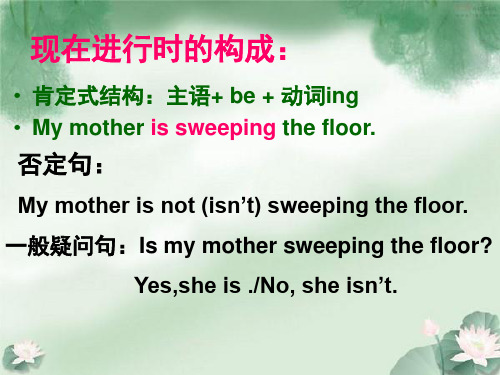
2. I’m going to visit my grandparents this
• A. put on B. wearing • C. wear D. putting on • ②That boy isn’t D the teacher. • A. listen B. listens • C. listening D. listening to
.
16
• ③I B this book now. • A. reading B. am reading • C. read D. wear
.
2
③以重读闭音节结尾的,双写结尾 的辅音字母加-ing.
Eg: stopping, shopping, sitting, swimming, putting, running.
④ 特殊变化的: Eg: lie lying
.
3
I’m writing something. I’m reading a book.
moment.
3.Mary often_w_a_t_c_h_e_s_(watch)TV on
Monday.But now she __is__c_le__a_n_in__g__
(clean) the house.
4.Andy _g_o_e_s___(go shopping) once a week.
flowers .
(看,我的父母亲正在浇. 花.)
18
课课清
1. Birds __ singing in the sky. 2. We ___English now.
√ A. is B. are C. am
√A. are speaking B. speaks C. speaking
高一英语时态讲解ppt课件.ppt

tomorrow.
(否定句)
Will I/ you/ she/ we/ they watch TV tomorrow?
(一般疑问句)
肯定回答:Yes, I/ you/ she/ we/ they will. 否定回答:No, I/ you/ she/ we/ they will not(won’t).
行 时
肯定:Yes,he/she is. 否定结:构N:o, he/she isn’t.
Sb. +is /are /am + v-ing.(肯定句)
SWb.e+/Tishne’ty//aYroenu’ta/raemwnaottc+hvin-igngT.(V 否no定w句.()肯定句)
IsW/Aer/eT+hSeby./+Yov-uinagr?e(n一’t w般a疑tc问hi句ng)TV now.(否定句) 肯A定re回w答e/t:heYeys/y, osbu. +wisa/tacrhe/inamg .TV now(?一般疑问句)
认识到了贫困户贫困的根本原因,才 能开始 对症下 药,然 后药到 病除。 近年来 国家对 扶贫工 作高度 重视, 已经展 开了“ 精准扶 贫”项 目
一般过去时
I watched TV last night
I watch TV everyday. 一般现在时
I am watching TV now. 现在进行时
一 般
肯定回答: Yes , I/we do. 否定回答:No, I/we don’t现.
He He
/ /
She She
wdoaetcshne’tswTaVtcehveTrVydeavye.r(yd肯ay定. 句()否定句)在时
英语八大时态PPT课件(详细版)

时态
A
知识导航
种类
一般现在时 一般过去时 一般将来时 现在进行时 现在完成时 过去进行时 过去完成时 过去将来时
构成
do/does did will/shall+动词原形 am/is/are + doing have/has+过去分词 was/were + doing had+过去分词 would/should+动词原 形
A
4
※表示主语所具有的特征、性格、 能力、状态等
She is a middle school student. She looks a little worried. ※某些以here/there开头的句子 中,用一般现在时表正发生的动 作
Here comes the bus.
A
5
※表示将来发生的、时刻表上不改变的事 The train leaves Hunan at five o’clock. ※特殊情况 在时间状语从句和条件状语从句中,若主 句用一般将来时,则从句用一般现在代替 将来。(主将从现)
A
21
四、一般将来时
1、构成 一般将来时态由
“will/shall+动词原形”构成,me to ask Mary for help.
A
22
2、其他表示
※be going to +动词原形:表示 说话人主观的打算或预测。 I am going to look for a job here. It is going to be a fine day for camping tomorrow.
【小试牛刀】 他们昨天这个时候正在吃晚餐。
They were having dinner this time yesterday.
A
知识导航
种类
一般现在时 一般过去时 一般将来时 现在进行时 现在完成时 过去进行时 过去完成时 过去将来时
构成
do/does did will/shall+动词原形 am/is/are + doing have/has+过去分词 was/were + doing had+过去分词 would/should+动词原 形
A
4
※表示主语所具有的特征、性格、 能力、状态等
She is a middle school student. She looks a little worried. ※某些以here/there开头的句子 中,用一般现在时表正发生的动 作
Here comes the bus.
A
5
※表示将来发生的、时刻表上不改变的事 The train leaves Hunan at five o’clock. ※特殊情况 在时间状语从句和条件状语从句中,若主 句用一般将来时,则从句用一般现在代替 将来。(主将从现)
A
21
四、一般将来时
1、构成 一般将来时态由
“will/shall+动词原形”构成,me to ask Mary for help.
A
22
2、其他表示
※be going to +动词原形:表示 说话人主观的打算或预测。 I am going to look for a job here. It is going to be a fine day for camping tomorrow.
【小试牛刀】 他们昨天这个时候正在吃晚餐。
They were having dinner this time yesterday.
英语四大时态复习 课件ppt课件

last night, last…, two days ago, …ago, 一般过去时: in 1999, just now =a moment ago,
yesterday
tomorrow, next week; next … in the 一般将来时: future ,in 2050 , in +一段时间
5. I __p_l_a_y_ (play) sports three times a day. 6. Look! Lucy and Lily _a_r_e__re_a_d_i_n_g(read) books.
7. There __w_a_s___(is) a football match yesterday afternoon. 8. Our class _w_e_n_t__( go) to the zoo three days ago. 9.We _w_i_ll_f_i_n_is_h_(finish) our homework in two hours. 10. She is going __to__p_l_a_y__(p. lay) ping-pong with us.
一般现在时 一般过去时 现在进行时 一般将来时
.
3对比
时态 现在进行 时
一般现在 时 一般过去 时
一般将来 时
表格对比学习
肯定句
否定句
一般疑问句
be+v-ing 在be 后加上not Be提到句首 (现在分词)
V -原形 V-s/es三单
在实义v.前用助动词 Do,Does 提
don’t ,doesn’t,行 到句首,实
everyday一般现在时一般过去时一般将来时tomorrowthfuturefiveminutes对比时态肯定句否定句一般疑问句现在进行表格对比学习beving现在分词后加上notbe提到句首原形vses三单在实义v
yesterday
tomorrow, next week; next … in the 一般将来时: future ,in 2050 , in +一段时间
5. I __p_l_a_y_ (play) sports three times a day. 6. Look! Lucy and Lily _a_r_e__re_a_d_i_n_g(read) books.
7. There __w_a_s___(is) a football match yesterday afternoon. 8. Our class _w_e_n_t__( go) to the zoo three days ago. 9.We _w_i_ll_f_i_n_is_h_(finish) our homework in two hours. 10. She is going __to__p_l_a_y__(p. lay) ping-pong with us.
一般现在时 一般过去时 现在进行时 一般将来时
.
3对比
时态 现在进行 时
一般现在 时 一般过去 时
一般将来 时
表格对比学习
肯定句
否定句
一般疑问句
be+v-ing 在be 后加上not Be提到句首 (现在分词)
V -原形 V-s/es三单
在实义v.前用助动词 Do,Does 提
don’t ,doesn’t,行 到句首,实
everyday一般现在时一般过去时一般将来时tomorrowthfuturefiveminutes对比时态肯定句否定句一般疑问句现在进行表格对比学习beving现在分词后加上notbe提到句首原形vses三单在实义v
一般现在时,一般过去式,一般将来时ppt课件
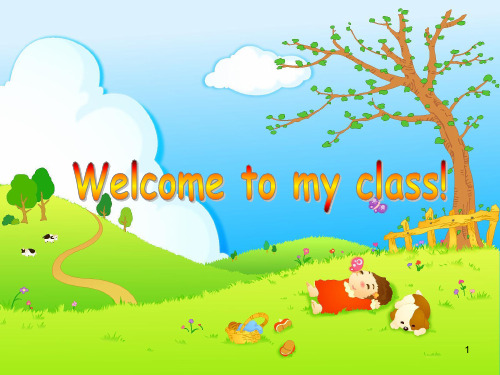
其否定形式一般是在谓语动词前 don’t,一般疑问句在句前加do
但当主语是第三人称单数时,谓语动词形式有变化,一般在动词
末尾加s,否定句在行为动词前加doesn’t, 一般疑问句在句前加 does 动词三单的变化: 1、一般动词后加s,如:reads,plays,works,makes 2、以 s,x,ch,sh, 结尾,后加es. 如:watches, 3、以辅音字母加o结尾,一般加es ,如:does,goes 4、辅音字母+y结尾的单词,去y,加ies,如:worries
1
一般现在时:Present Simple
表示经常或者反复发生的动作
信息词:
often(经常)
sometimes(有时)
always(总是)
usually(通常)
every day(每天)
every week(每周)
every month(每月) every term(每学期)
every year(每年)
4
定义: 一般现在时:1、表达经常性或习惯性的动作。
2、表示现在的状态。 例如: 1、我们每天都上学。
We go to school every day.
2、下课后我们打扫教室。
We clean the classroom after class.
3、有时我们在操场上踢足球 。
We sometimes play football on the playground.
What do the elephants like eating?
4. He sends two emails every week.
How many emails does he send every week?
但当主语是第三人称单数时,谓语动词形式有变化,一般在动词
末尾加s,否定句在行为动词前加doesn’t, 一般疑问句在句前加 does 动词三单的变化: 1、一般动词后加s,如:reads,plays,works,makes 2、以 s,x,ch,sh, 结尾,后加es. 如:watches, 3、以辅音字母加o结尾,一般加es ,如:does,goes 4、辅音字母+y结尾的单词,去y,加ies,如:worries
1
一般现在时:Present Simple
表示经常或者反复发生的动作
信息词:
often(经常)
sometimes(有时)
always(总是)
usually(通常)
every day(每天)
every week(每周)
every month(每月) every term(每学期)
every year(每年)
4
定义: 一般现在时:1、表达经常性或习惯性的动作。
2、表示现在的状态。 例如: 1、我们每天都上学。
We go to school every day.
2、下课后我们打扫教室。
We clean the classroom after class.
3、有时我们在操场上踢足球 。
We sometimes play football on the playground.
What do the elephants like eating?
4. He sends two emails every week.
How many emails does he send every week?
初中英语语法 一般现在时、过去时、将来时完整ppt课件
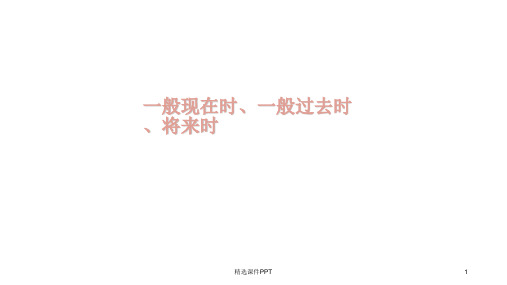
egtwoplusfourmoongoesaround经常性习惯性的动作经常性习惯性的动作目前的爱好能力目前的爱好能力客观事实客观事实动词三单形式规则变法
一般现在时、一般过去时 、将来时
精选课件PPT
1
Let's distinguish!
1. He does his homework every day. 2. I am a teacher. 3. We played the piano last Sunday. 4. They were at school just now.
going to 多用于自己打算、计划或有意做某事。
• 二、探究:
•1、动词come/go/leave/move/arrive/start等不和be going to连用,常用be
coming/going/leaving/moving/arriving/starting等来表示即将发生或安排好要做
的事。
---I ______ to the Great Wall.
A. go B. went
C. will go D. have gone
精选课件PPT
11
一一.一般般将将来来时时是(S表im示p从le现在fu开tu始re将t来en要s发e)生的事。
二.肯定句构成: 1. be going to do sth. 2. will / shall do sth.
Yes, they were.
No, they weren’t.
He could swim at the age of ten.
He couldn’t swim at the age of ten.
It took two hours to go there.
一般现在时、一般过去时 、将来时
精选课件PPT
1
Let's distinguish!
1. He does his homework every day. 2. I am a teacher. 3. We played the piano last Sunday. 4. They were at school just now.
going to 多用于自己打算、计划或有意做某事。
• 二、探究:
•1、动词come/go/leave/move/arrive/start等不和be going to连用,常用be
coming/going/leaving/moving/arriving/starting等来表示即将发生或安排好要做
的事。
---I ______ to the Great Wall.
A. go B. went
C. will go D. have gone
精选课件PPT
11
一一.一般般将将来来时时是(S表im示p从le现在fu开tu始re将t来en要s发e)生的事。
二.肯定句构成: 1. be going to do sth. 2. will / shall do sth.
Yes, they were.
No, they weren’t.
He could swim at the age of ten.
He couldn’t swim at the age of ten.
It took two hours to go there.
一般过去时现在进行时一般现在时时态讲解练习ppt课件

4. _D_i_d___ you __vi_si_t___ (visit) your relatives last Spring Festival?
5. _D_i_d___ he _fl_y_____ (fly) a kite on Sunday? Yes, he __d_i_d __.
经营者提供商品或者服务有欺诈行为 的,应 当按照 消费者 的要求 增加赔 偿其受 到的损 失,增 加赔偿 的金额 为消费 者购买 商品的 价款或 接受服 务的费 用
一、用be动词的适当形式填空 1. I _am_____ an English teacher
now. 2. She _w_a_s____ happy yesterday. 3. They _w_e_re____ glad to see each
other last month.
经营者提供商品或者服务有欺诈行为 的,应 当按照 消费者 的要求 增加赔 偿其受 到的损 失,增 加赔偿 的金额 为消费 者购买 商品的 价款或 接受服 务的费 用
1.一般过去时表示过去某个时间发生 的动作或存在的状态,常和表示过去的 时间状语连用。一般过去时也表示过去 经常或反复发生的动作。
经营者提供商品或者服务有欺诈行为 的,应 当按照 消费者 的要求 增加赔 偿其受 到的损 失,增 加赔偿 的金额 为消费 者购买 商品的 价款或 接受服 务的费 用
2.Be动词在一般过去时中的变化: ⑴am 和is在一般过去时中变为
母,双写末尾的辅音字母,再加ing,如:runrunning, stop-stopping
经营者提供商品或者服务有欺诈行为 的,应 当按照 消费者 的要求 增加赔 偿其受 到的损 失,增 加赔偿 的金额 为消费 者购买 商品的 价款或 接受服 务的费 用
5. _D_i_d___ he _fl_y_____ (fly) a kite on Sunday? Yes, he __d_i_d __.
经营者提供商品或者服务有欺诈行为 的,应 当按照 消费者 的要求 增加赔 偿其受 到的损 失,增 加赔偿 的金额 为消费 者购买 商品的 价款或 接受服 务的费 用
一、用be动词的适当形式填空 1. I _am_____ an English teacher
now. 2. She _w_a_s____ happy yesterday. 3. They _w_e_re____ glad to see each
other last month.
经营者提供商品或者服务有欺诈行为 的,应 当按照 消费者 的要求 增加赔 偿其受 到的损 失,增 加赔偿 的金额 为消费 者购买 商品的 价款或 接受服 务的费 用
1.一般过去时表示过去某个时间发生 的动作或存在的状态,常和表示过去的 时间状语连用。一般过去时也表示过去 经常或反复发生的动作。
经营者提供商品或者服务有欺诈行为 的,应 当按照 消费者 的要求 增加赔 偿其受 到的损 失,增 加赔偿 的金额 为消费 者购买 商品的 价款或 接受服 务的费 用
2.Be动词在一般过去时中的变化: ⑴am 和is在一般过去时中变为
母,双写末尾的辅音字母,再加ing,如:runrunning, stop-stopping
经营者提供商品或者服务有欺诈行为 的,应 当按照 消费者 的要求 增加赔 偿其受 到的损 失,增 加赔偿 的金额 为消费 者购买 商品的 价款或 接受服 务的费 用
一般将来时英语一般过去时现在进行时一般现在时专项练习省名师优质课赛课获奖课件市赛课一等奖课件
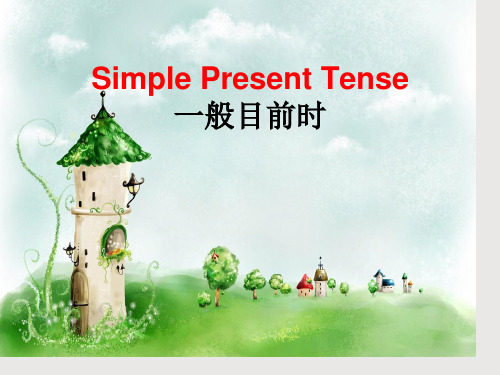
用所给动词旳合适形式填空:
1. We often____p_l_a_y____(play) on the playground. 2. He ___g_e_ts____(get) up at six o’clock. 3. _D__o___you _b_r_u_s_h_(brush) your teeth every morning? 4.What _d_o_e_s (do) he usually _d_o___ (do) after school? 5. Dannys_tu__d_ie_s(study) English, Maths and Science Art. 6.He sometimes _g_o_e_s____(go) to the park with his sister.
3. His sister likes playing table tennis (改为否定句) His sister doesn’t like playing table tennis.
4. Nancy doesn’t run fast (肯定句) Nancy runs fast .
5. I watch TV every day. (改为一般疑问句) Do you watch TV every day?
7. At 8:00 A.M, she w__a_t_ch__es_(watch) TV with her parents. 8. __D__o_es___ Mike__r_e_ad____(read) English every day? 9. How many lessons _d_o_e_s__ your classmate__h_a_v_e__
There is going to be an evening tomorrow .
英语语法一般现在时、一般过去时和一般将来时课件

五. 一般将来时的定义: 表示将来发生的动作或者状态。常搭配的时间标志词有 tomorrow(明天),the day after tomorrow(后天), next week(下周), in the future(将来), in three days (三天后)等等。
六.一般将来时的各种句式:见下表
英语语法 一般现在时 一般过去时 一般将来时
课件
一.一般现在时的定义 表示经常性或习惯性的动作或当前存在的状态。常搭配的时 间标志词有sometimes(有时),often(经常),usually (通常),always(一直),every day(每天),once a week(一周一次)等连用。
二.一般现在时的各种句式:见下表
例如:I usually get up at 6:30 in the morning.我通常早上6点 半起床。 (usually“通常”,表示习惯性的动作。说明主语“I”每天 早上都是这点点儿起床。)
三.一般过去时的定义: 表示发生在过去的动作或存在的状态。常用的时间标志词有 yesterday(昨天),last week(上周),two month ago(两 个月前),the day after tomorrow(前天),in 1990(在1990 年)等.(冉老师有话说:in 1990意为“在1990年”;in 1990s“在20世纪90年代”,包含1990——1999年。)
四.一般过去时的各种句式:见下表
例如:I got up at 6:30 the day before yesterday.我前天6点 半起的床。 (the day before yesterday“前天”已经是一个过去的时间 ,所以起床get up用的是其一般过去时。got up的原形为ge family will have a picnic tomorrow.=Our family is going to have a picnic tomorrow.我们家明天会去野餐一回。 (两个句子可以进行句型转换。这里呢冉老师要讲解一下第二 句中为什么our family后面的谓语动词用的是三单形式的is,因 为此处把”our family”看作一个整体,没有强调这个家庭里面 的各个成员,所以用的是三单形式的is。)
现在进行时一般现在时一般将来时复习PPT课件
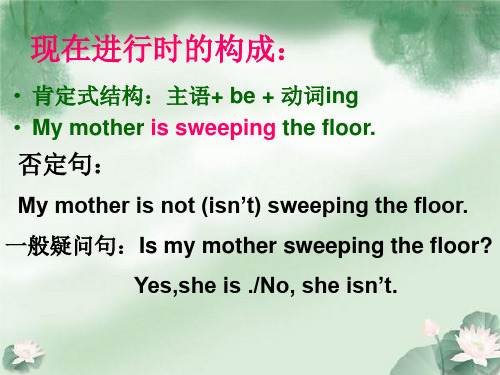
run She is running.
Play computer games
He is playing computer games.
draw They are drawing.
swim They are swimming.
play basketball
They are playing basketball.
学生将来用计算机来学习.
Students will use computers to study.
2. Will there be schools in the future ? There will be … 将会有…… 如:
将来每张桌子上都会有一台计算机.
There will be a computer on every desk in the future.
√ A. runs B. run C. running
1.我们正玩得开心. We are having a good time. 2.现在你在干什么呢? What are you doing now?
3.他们不是在等车. They are not waiting for a bus.
现在进行时与一般现在时的区别:
swim
have a picnic play basketball
I’m going to swim. because I like the sea. I’m going to have a picnic.becauseI like nice food. I’m going to play basketball. because I like sports
4学生会在电脑与老师交谈。
The students __w_i_ll__ta__lk__t_o_t_h_e__ir__te_a__c_h_e_rosn their computers.
时态练习题PPT课件

一般将来时 现在进行时 过去进行时 过去将来时 现在完成时 过去完成时
第3页/共53页
他去上学
一般现在时 He goes to school. 一般过去时 He went to school. 一般将来时 He will go to school.
现在进行时 过去进行时 过去将来时 现在完成时 过去完成时
第25页/共53页
过去进行时
第26页/共53页
1.概念:表示过去某段时间或某一时刻正在发生或 进行的行为或动作。
2.时间状语:at this time yesterday, at that time或以 when引导的谓语动词是一般过去时的时间状语等。
3.基本结构 主语+was/were +doing +其他
A is going to be; will have B will be; is having
C will be; is going to have D will have; is going
to be
8 Li Ming is 10 years old now, next year he
_____11.
第4页/共53页
他去上学
一般现在时 He goes to school. 一般过去时 He went to school. 一般将来时 He will go to school. 现在进行时 He is going to school.
过去进行时 过去将来时 现在完成时 过去完成时
第5页/共53页
school. 现在完成时 He has gone to school. 过去完成时 He had gone to school.
第9页/共53页
第3页/共53页
他去上学
一般现在时 He goes to school. 一般过去时 He went to school. 一般将来时 He will go to school.
现在进行时 过去进行时 过去将来时 现在完成时 过去完成时
第25页/共53页
过去进行时
第26页/共53页
1.概念:表示过去某段时间或某一时刻正在发生或 进行的行为或动作。
2.时间状语:at this time yesterday, at that time或以 when引导的谓语动词是一般过去时的时间状语等。
3.基本结构 主语+was/were +doing +其他
A is going to be; will have B will be; is having
C will be; is going to have D will have; is going
to be
8 Li Ming is 10 years old now, next year he
_____11.
第4页/共53页
他去上学
一般现在时 He goes to school. 一般过去时 He went to school. 一般将来时 He will go to school. 现在进行时 He is going to school.
过去进行时 过去将来时 现在完成时 过去完成时
第5页/共53页
school. 现在完成时 He has gone to school. 过去完成时 He had gone to school.
第9页/共53页
- 1、下载文档前请自行甄别文档内容的完整性,平台不提供额外的编辑、内容补充、找答案等附加服务。
- 2、"仅部分预览"的文档,不可在线预览部分如存在完整性等问题,可反馈申请退款(可完整预览的文档不适用该条件!)。
- 3、如文档侵犯您的权益,请联系客服反馈,我们会尽快为您处理(人工客服工作时间:9:00-18:30)。
We sometimes play football on the playground. 4、我在学校吃晚饭。
I have dinner at school. 5、杰克喜欢英语。
Jack likes English. 6、他是一个学生。 He is a student.
一般现在时:Present Simple 表示经常或者反复发生的动作
(have) on Monday? 10. What time __d_o_e_s_ his mother___d_o_____(do) the
housework?
改句子
1. Do you often play football after school? (肯定回答) Yes . I do .
2. I have many books. (改为否定句) I don’t havex/sh/ch 结尾的动词 +es 读作 [iz]
7. Snow _S__n_o_w_s 3. 以辅音字母+y 结尾的动词
8. Carry _C__a_r_r_ie_s__ 把y改i加es 读作 [z]
9. Stop __S_t_o_p_s 10.See ___S_e_e_s 11.Drive _D__r_iv_es 12.Let ___L_e_t_s_ 13.Play __P_l_a_y_s
Where does he have lunch?
Let’s correct (改错):
1. I ggooes to school at six every day. 2. He ddooesnn’’tt like playing football. 3. 3. Thelyikleikes playing games. 4. 4. Daminwgatwchaetschs TV in the evening. 5. 5. Does he usuallhyavehas a party? 6. 6. What do theydoononSSuunnddaayy? 7. 7. Tonyalgwoaeyss gaolewsays to school at eight o’clock. 8. 8. Whadto they eat in the party? 9. 9. Lilyhahsaves lunch at school.
4. 以元音字母+y 结尾的动词 直接加+s 读作 [z]
5. 以 o 结尾的动词 加+es 读作 [z]
一般现在时:
1、表达经常性或习惯性的动作。
2、
表示现在的状态。
例如: 1、我们每天都上学。
We go to school every day. 2、下课后他们打扫教室。
They clean the classroom after class. 3、有时我们在操场上踢足球 。
6. David has a goal. (改为一般疑问句) Does David have a goal ?
7. We have four lessons.(否定句) We don’t have four lessons.
对下列句子划线部分提问: 1. I get up at six o’clock.
信息词 (时间状语) :
often(经常)
sometimes(有时)
always(总是)
usually(通常)
every day(每天)
every week(每周)
every month(每月)
every term(每学期)
every year(每年)
once a week (一周一次)
twice a year(一年两次)
Simple Present Tense 一般现在时
写出下列动词的第三人称单数形式:
1. Wash _W__a_s_h_e_s__
归纳
2. match _M__a_t_c_h_es 1. 大多数动词+s 清辅音后读作
3. guess __g_u_e_ss_es
[s]; 浊辅音、元音后读作[z]
4. Study __S_tu_d__ies 5. Finish _F_i_n_i_sh__es 6. Go __G__o_es___
3. His sister likes playing table tennis (改为否定句) His sister doesn’t like playing table tennis.
4. Nancy doesn’t run fast (肯定句) Nancy runs fast .
5. I watch TV every day. (改为一般疑问句) Do you watch TV every day?
4. He sends two emails every week.
How many emails does he send every week?
How often does he send two emails?
5. 5.He has lunch at school. 6. Who has lunch at school?
When do you get up?
2. They usually go to the park on Sunday.
What do they usually do on Sunday?
3. The elephants like eating fruits.
What do the elephants like eating?
用所给动词的适当形式填空:
1. We often____p_l_a_y____(play) on the playground.
2. He ___g_e_ts____(get) up at six o’clock. 3. _D__o___you _b_r_u_s_h_(brush) your teeth every morning? 4.What _d_o_e_s (do) he usually _d_o___ (do) after school? 5. Dannys_tu__d_ie_s(study) English, Maths and Science Art. 6.He sometimes _g_o_e_s____(go) to the park with his sister.
7. At 8:00 A.M, she w__a_t_ch__es_(watch) TV with her parents. 8. __D__o_es___ Mike__r_e_ad____(read) English every day? 9. How many lessons _d_o_e_s__ your classmate__h_a_v_e__
